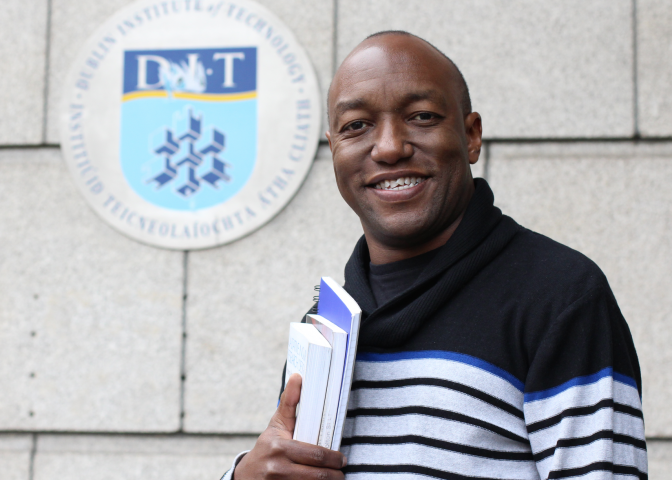Flavian Majenga Lihwa
(Tanzania)
MSc in Sustainable Development, Technological University Dublin (formerly DIT)
Flavian works as an Education Programme Coordinator in Tanzania, overseeing the implementation of girls' education and leadership initiatives. He received a fellowship in 2015-16 to study for a Master of Science in Sustainable Development at Technological University Dublin.

...having gained a broader and more in-depth perspective on sustainable development, I am looking forward to engaging in policy development and implementation, especially in promoting sustainable livelihoods and sustainable use of the limited resources – especially land – in my country.
I have worked with CARE International in Tanzania for the past 13 years in education programmes. My last engagement was as an Education Programme Coordinator with a primary role of providing oversight on implementation of girls’ education and leadership initiatives. As a programme coordinator, I led national level policy advocacy efforts to promote access to quality basic education among marginalised and vulnerable girls in rural Tanzania. I was also responsible for managing a field programme office in north-western Tanzania.
I chose the MSc in Sustainable Development because the course brings a sustainability perspective into development matters. I was therefore interested to gain a better understanding on how Tanzania as a country can achieve development without compromising on nature and the wellbeing of the society. On a similar note my organisation is undergoing restructuring to better position itself as a partner of choice in areas of women’s empowerment, climate change and sustainable use of natural resources. This change will require staff with new skills and attitudes towards development and working with partners.
Through my course I have gained an understanding of development and sustainability from an economic, social and environmental perspective. I have come to realise that development is not a linear process as it was originally conceived, especially by the western world. Global warming and the resulting climate change will be the major challenges for developing countries to tackle if at all they want to achieve sustainable development. An understanding of why and how climate change is happening has enabled me to develop a better perspective on approaches to be taken by my country, which is mainly composed of rural farmers, to achieve development. From an economic perspective, I have benefitted from learning about factors for economic growth and how such factors, if not managed properly, may lead into an economic crisis. Lessons on how Ireland developed into a strong economy in Europe in the 1980s to an economic crisis in late 2000s will prove useful to my country.
So far I have gained some skills including the use of the DPSIR (Driving forces; Pressures; States; Impacts; Responses) framework to analyse the effect of interaction between society and the environment and develop appropriate policies that will reduce the impact on the environment and hence mitigating the effects of the changing climate; using an ecosystem services approach to build an argument towards protection of ecosystems and developing potential approaches for ecological restoration; writing communiqués to the media or decision makers in order to argue or call for action on a certain cause; conducting a critical review of urban development plans and providing feedback to planners on how to develop sustainable cities.
My research topic is on Adaptation to Climate Change - challenges for smallholder farmers in rural Tanzania. The study will look into challenges that face smallholder farmers in rural Tanzania as they attempt to integrate solutions to adapt to climate change in their farming practices. I will attempt to answer questions on how the national policies on agriculture and climate change influence such challenges and what drives smallholder farmers to adopt certain available options.
Living in Ireland has been the most rewarding experience in my career. I have learned about the lifestyle and culture of a developed country and saw some contrasts and similarities with life back home.
When I return home, I will be designing new development projects with a view of sustainable development in mind. Not only do we want our Tanzanian society to develop, but also such development must take into consideration future generations that are going to rely on the same resources that we have today. I will also be more involved in programme design as opposed to mainly working on programme management that I used to do before coming to Dublin. I am looking forward to work with the natural resources team where I will engage in developing programmes on sustainable livelihoods.
The changing climate has negatively impacted the sub-Saharan region with unpredictable rains, floods and extended droughts that lead to food insecurity. These changes pose a major risk for Tanzania, a country with more than 60% of the population living in rural areas and entirely dependent on subsistence agriculture. I am looking forward to Tanzania growing into a middle-income country that has developed infrastructure to support growth of rural economy, but also with mechanisms in place that will ensure a sustainable use of the limited natural resources available.
On a personal level, having gained a broader and more in-depth perspective on sustainable development, I am looking forward to engaging in policy development and implementation, especially in promoting sustainable livelihoods and sustainable use of the limited resources – especially land – in my country. In the future, I see myself either working with government ministries as a policy developer or working with both local and international level NGOs to develop programmes that will help communities adapt to the changing climate and promote education for sustainable development.